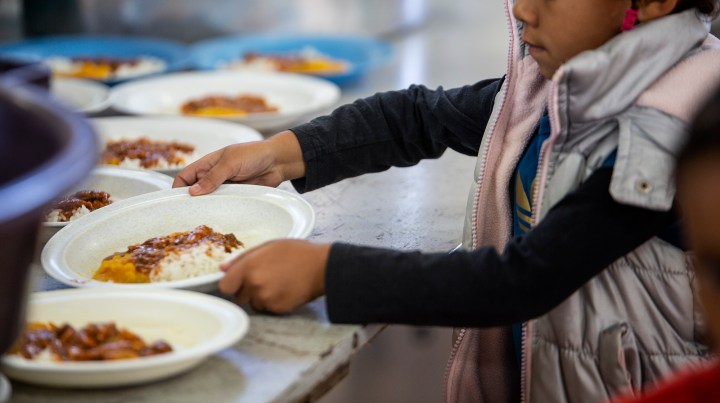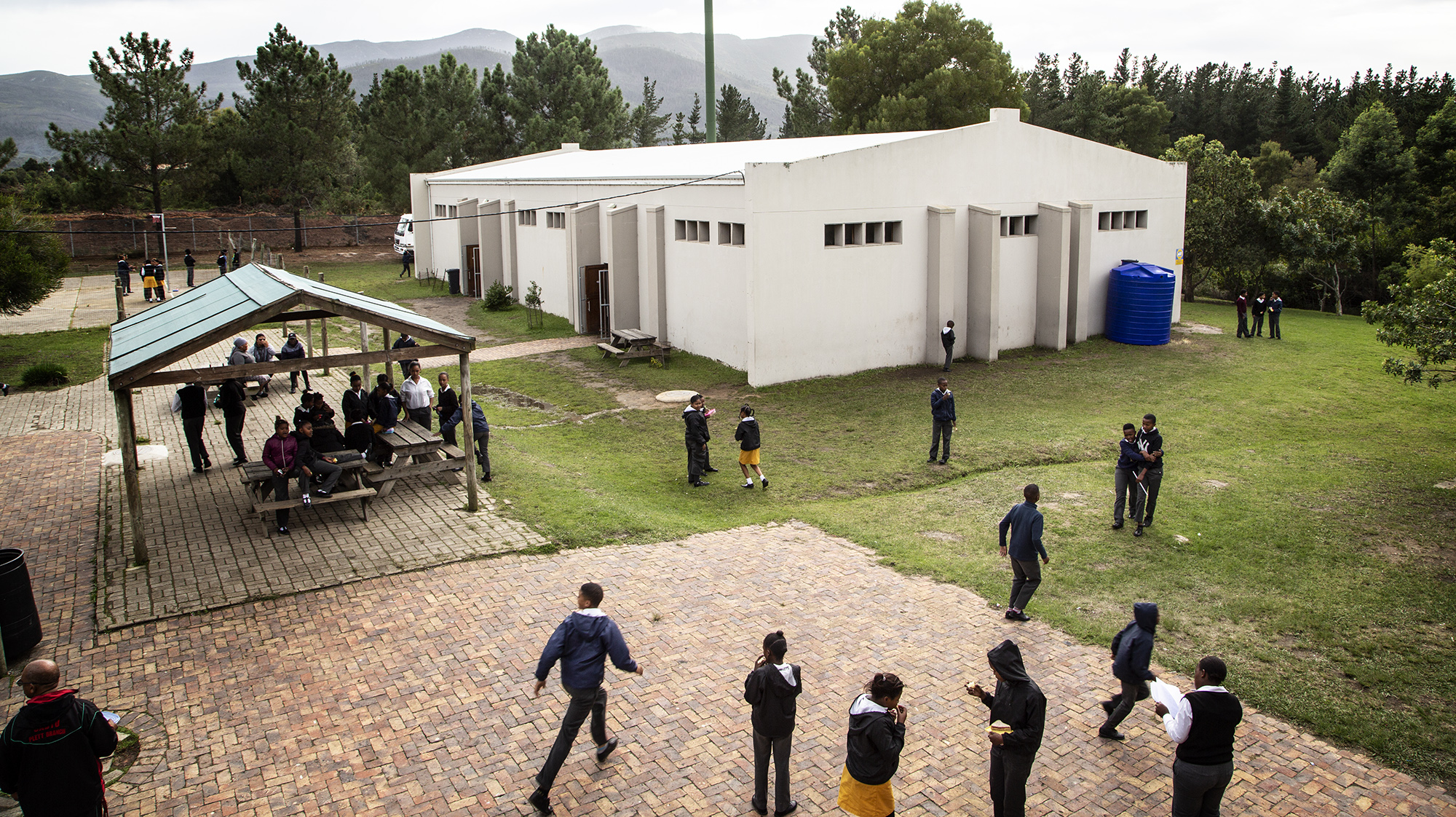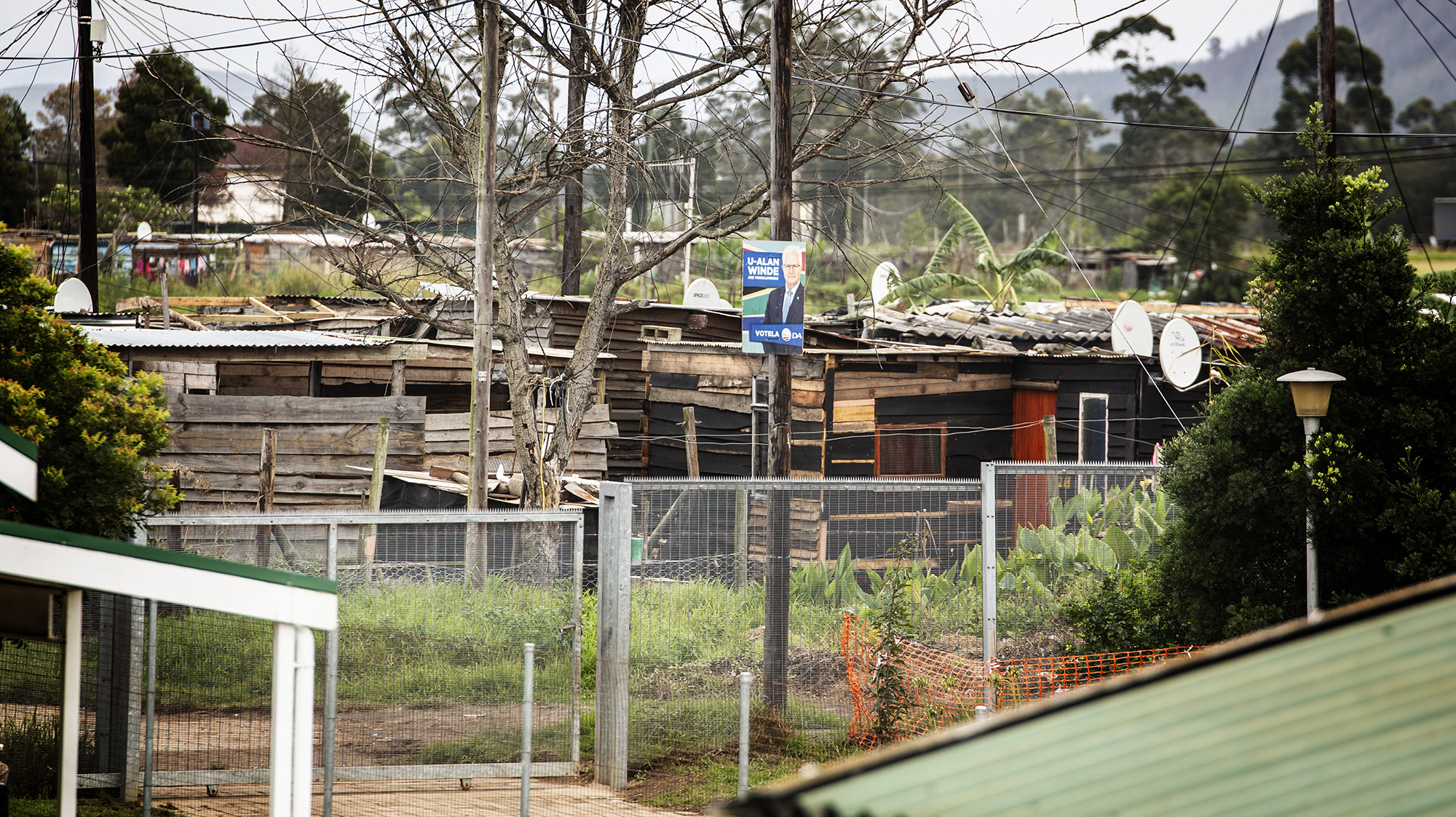State of the Nation
Hunger aplenty on the fringe of seaside luxury

Food security is a global crisis. In South Africa, almost seven million people ‘experienced hunger’ in 2017 and more than 10 million people had inadequate access to food, according to the Stats SA General Household Survey. Ahead of World Hunger Day on 28 May, Daily Maverick reports on a school feeding programme in one of the most unequal parts of Western Cape.
The Crags Primary School in Kurland, Western Cape seems like any other. The bell rings on a frosty autumn morning and children line up outside their classrooms. Little girls with plaited hair chatter, boys tuck in their shirts and pull up their socks to protect their legs from the morning cold.
Crags Primary has 550 pupils. From Grade R to Grade 7, most of the classes cater for between 35 and 40 learners who come from some of the most underprivileged households in the area. Inequality is stark in the region. The Garden Route is a popular destination for international tourists and the area is well known for its luxury accommodation and golf courses, beachfront holiday homes and lush polo fields. That’s polo fields. Plural. Just off the N2 lies Kurland Village, a rural township where unemployment is high, substance abuse is rife and some children are visibly undernourished.

The Crags Primary School Hall where learners have their meals. The hall was built with the help of a number of international and national donors and local companies. (Photo: Daily Maverick)
Benjamin Louw has been the principal at Crags Primary since 2008. He boasts about its high pass rate (95%), the variety of sports on offer and the values the “school family” shares. His greatest concern is that the majority of learners come from single-parent households and many of those parents are seasonal workers on a holiday route where “season” is a mere three months of the year.
“You can see where these kids come from,” says Louw, referring to the settlement that lies outside the school gates. Some homes are brick and mortar while others are timber Wendy houses and corrugated iron structures.

A political poster at informal settlement Kurland Village, in The Crags, in the heart of the Garden Route in the Western Cape. Many children who live there attend Crags Primary School. Most learners are on the National School Nutrition Programme. (Photo: Daily Maverick)
Bitou Municipality, formerly known as Plettenberg Bay Municipality, includes areas such as Nature’s Valley, the Crags, Keurboomstrand, Plettenberg Bay and Harkerville. Much like the rest of the country, Bitou Municipality has had its fair share of pre-election unrest. On 20 February 2019, crowds of protesters took to the streets in Plettenberg Bay, stoning vehicles, burning tyres and blocking the N2 in their demand for electricity. In June 2018 residents in New Horizons and Kwanokuthula in Plettenberg Bay took to the streets demanding housing, schools, health care services and jobs.
According to the Bitou Socio Economic Profile Document published in 2017, the population is 56,000. Inequality is higher than in the neighbouring region, Eden District. Tourism is the foundation of the Bitou economy, but unemployment has increased steadily over the past decade. In 2005, unemployment was at 22% and increased to almost 28% in 2016.
Most of the learners are affected by the socio-economic challenges of the region. The National School Nutrition Programme, which began in 1994 and feeds more than nine million children in schools across South Africa, helps to feed the children at Crags Primary. According to Jessica Shelver, spokesperson for Western Cape Education MEC Debbie Schäfer, for the 2018-19 financial year more than 400,000 learners will have received two meals at more than 1,000 schools in the province every school day at a cost of R385-million.
Learners at Crags Primary get porridge and milk in the morning, followed by lunch in the afternoon. Louw encourages learners to come to school by 7.30am to get a meal before the first bell rings, but of course, there is sometimes a stigma attached to those plates.

Shirley Grootboom and Yvonne Ncapay, two of the three cooks at The Crags Primary School, dish up food for the learners. (Photo: Daily Maverick)
“The children are scared, they don’t want to speak and say that there’s no food at home. But you can see children are here every morning to get their breakfast, so that’s when you know there’s no food at home,” says Louw.
According to a study released by Stats SA, Towards measuring food security in South Africa: An examination of hunger and food inadequacy, more than a quarter of the population lived below the food poverty line in 2017. The Stats SA 2017 General Household Survey found that 6.8 million people “experienced hunger” and more than 10 million people had inadequate access to food in 2017. Stats SA also found a correlation between levels of unemployment and access to food and noted that inadequate access to food was predominantly found among households that had more than eight household members, and households that had children.
Despite the desperate situation at many homes, the top three political party manifestos campaigning in the May 8 elections had very little to say about child nutrition. The EFF manifesto did not mention it at all, the DA manifesto considered food security alongside land reform, the consequences of child malnutrition, agriculture and the inadequacy of child grants in meeting the nutritional needs of children. The ANC manifesto mentioned food security in the context of land reform and community food gardens as a means to reduce hunger.
Evangeline Koeberg, the co-ordinator for the feeding scheme at Crags Primary, has been working at the school since 2008 and besides being responsible for feeding 550 learners each day, she also teaches the Grade 1s. “They come to school and they can’t function if they don’t eat,” she says. The three cooks who prepare meals for the schools receive a stipend from the department of a mere R1,200 a month.
The school also has a vegetable garden, headed by Welcome Maso, who has been tending to it for the past three years. The three cooks, Shirley Grootboom, Yvonne Ncapay and Gert Fixter use some of the carrots, onions, lettuce, cucumbers, spinach and green beans from Maso’s garden in the meals and the surplus harvest is sold to surrounding businesses.
Even though the National School Nutrition Programme provides fish, lentils, samp and beans to the school, a local NGO named Masizakhe: Food4Learning, collects funds to buy Crags Primary additional ingredients such as butter, spices and beef stock as well as fresh fruit and vegetables, which helps make the basics from the department tastier and more nutritious.
A nearby farm donates fresh milk three times a week, which the learners have with their porridge in the morning.
“The children really enjoy that fresh milk,” says Koeberg. She says top of their taste bud list is samp and beans. They’re not so keen on the sardines, but Koeberg continuously gets feedback from the little ones to make sure that children don’t just eat, but enjoy their meals.
Masizakhe was established in 2004 and has touched the lives of many in Kurland Village. Their main donors are international visitors and local businesses including Kurland Bricks and The Kurland Hotel.
Administrator for Masizakhe Elizabeth Jacobs runs off a list of what the NGO has achieved. They purchase uniforms and winter clothes for some learners when the weather begins to turn, as well as uniforms for the sports teams. Masizakhe also built a school hall and purchased tables where the learners eat their meals. Formerly they ate their meals outside.

The hall at Crags Primary School where learners enjoy their daily meals. Before the hall was built by the NGO Masizakhe: Food4Learning, children would eat their meals outside. (Photo: Daily Maverick)
Masizakhe also hires a social worker, Wyanitah Frans, who works with the children and parents. Frans says the social problems children are exposed to at home often follow them into the school grounds.
Alcoholism and drug abuse are rife, physical and sexual abuse are a daily reality. Employment offered by tourism runs from November to February, leaving seasonal workers destitute when tourists stay away over winter. Parents who are lucky enough to have year-round employment spend long hours at work in the closest town, 20km away, Plettenberg Bay. According to Wazimap, which uses data from the 2011 National Census, 36% of households are run by women, 86% of children in the area go to school and the annual household income is R30,000 a year, which translates into just R2,500 a month.
“There is real need,” says Jacobs. Besides assisting learners at Crags Primary, the NGO also supports the elderly and needy in Kurland Village. They provide toiletries, fruit, vegetables as well as stationery and toys to a local creche. And they work together with the local clinic to identify and provide food to needy patients, including those with TB and HIV, young mothers and pregnant teens. According to Jacobs, teen pregnancy is one of the greatest challenges in Kurland Village, and even though many people in Kurland Village live on grants, it’s simply “not enough”.
“It’s nothing. You have to buy food and clothing for a child and if you look at the need of the child [the grant] is not enough… everything is more and more expensive,” says Jacobs.
The Department of Science and Technology’s Centre of Excellence in Food Security released a study on school feeding in South Africa in 2018 and found that even though school meals are welcome government intervention, the consequences of nutritional deficiencies may already be too advanced to reverse by the time they are of school-going age. Intervening with children under two years old is the best way to tackle nutrition deficits among school-aged children.
Nutritional deficiencies can lead to a number of health problems including “stunting” or defective bone growth which is an indicator of undernutrition, a weak immune system, memory loss and fatigue. Food parcels were given to the clinic often go to expecting mothers, or grandparents with young children to look after, meaning nutrition is provided (at least in some cases) well before children are of school-going age.
Peter Reynolds, 85, a retired lawyer, spends much of his time fundraising for Masizakhe and encourages friends, family and international visitors to donate money towards the NGO.
“If I can do something during the rest of my days, the very happy and comfortable life that I’ve lived, because I have, I’ve been very fortunate, and if you think about it, I must do something now to give back. The way to live properly is to think of other people,” he says.

Learners at Crags Primary School in Kurland, play netball during the first break. (Photo: Daily Maverick)
Reynolds and Jacobs both say that Masizakhe is “for the kids”, but their reach goes much further. Jacobs lives in Kurland Village and during a walk around the area she says that despite the myriad social problems she still has hope.
“There are so many people who come through here and help us,” she says adding that a child will “never go hungry” in Kurland Village. “If you see a child walking and asking for food, they will get food. We are a close-knit community and we look after each other,” she says.
“Someone said to me the other day that the world has changed. People no longer have extra funds to [donate], they need it for themselves. I suppose that is true to an extent, but not everyone struggles financially,” says Reynolds. DM
Dougan and Payne stayed at the Kurland Hotel as guests during their three-night trip.

















 Become an Insider
Become an Insider